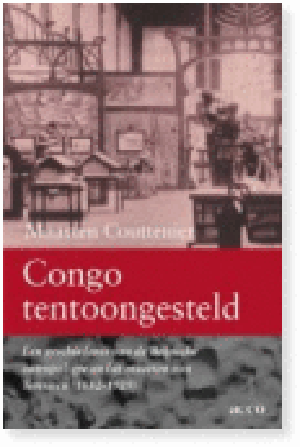During several World Fairs (1885-1897), Congolese were exhibited in Belgium. A ‘typical village’ was erected for them, in which they were asked to ‘do what they normally did’. Mostly, the women would have something at hand: care for the children, pound cassava,.. and the men not much; in some cases they just started helping the women.Sometimes, the public could walk between the huts. In most cases they were held on a distance by a fence.
“The onlookers would for example throw coins in the water, that were dived for by the Congolese. A fence had to avoid as much as possible the contact between white and black, although that would not always work. Intrusive visitors gave money and bottles of gin and brandy to the Congolese, which led to drunkenness and fights.”
(Couttenier p 135 – my translation from Dutch)
Many World Fairs featured shows, mostly on stages, at which the men were enacting for example war scenes with spears and shields. There was very little attention for the exhibited peoples own artforms. To the westerner, the music sounded like unbearable rattle.
Meanwhile, the organizer of the exhibition sought ‘authenticity’. Therefore, the Congolese and other others had to show themselves half naked, in good and bad weather. In 1897, during an extremely cold summer, the Congolese were rowing on the ponds at the Tervuren museum. Many got ill.
Seven of them died during their stay in Belgium.
That fact provided us with a trauma we still suffer from; all the more because during the exhibitions already many Europeans had protested. They were against colonialism, exploitation, dehumanization. But they had not won. The organizers had a very strong argument that capitalized on the greedy nature of the human being:
“The displaying of the natural resources of the Congo had to propitiate public opinion towards the colonial project, at a time when Leopold II borrowed enormous loans from the Belgian state. The extraordinary quantities of imported and exported products displayed at the expo had to shut up the opponents of the colonial project : ‘In your own interest, the moment has come to shut up’.” (Couttenier p131- my translation)
I am not saying that the opponents did shut up after this, but the big weight (and money and power) were with the proponents of colonialism.

